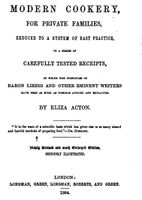Advertisement
On the Proper Fermentation of Dough
By Eliza Acton
Published 1845
As we have previously said, too large a proportion of yeast, which is very commonly used by persons not well skilled in bread-making, although it produces quickly a light spongy dough, has a very bad effect on bread, which it renders much less easy of digestion than that which is more slowly fermented, and far less sweet and pleasant in flavour: it also prevents its remaining eatable the same length of time, as it speedily becomes dry. It is likewise very disadvantageous to make the dough so lithe that it spreads about in the oven; and if it be excessively stiff, and its management not thoroughly understood, it will sometimes be heavy, To prevent this, it should be kept quite warm (never heated), and left a much longer time to rise. It will frequently then prove excellent. It will ferment rather more quickly if, when it gives symptoms of becoming light it is made up into loaves with the least possible kneading, and a slight incision is made round them and across the tops, and they are then placed in a warm air, and kept secure from cold currents passing over them.

